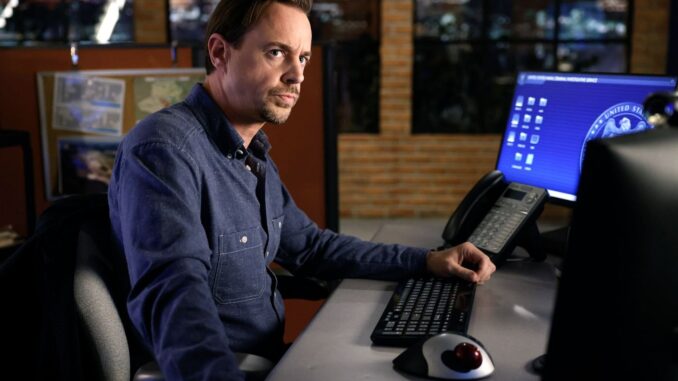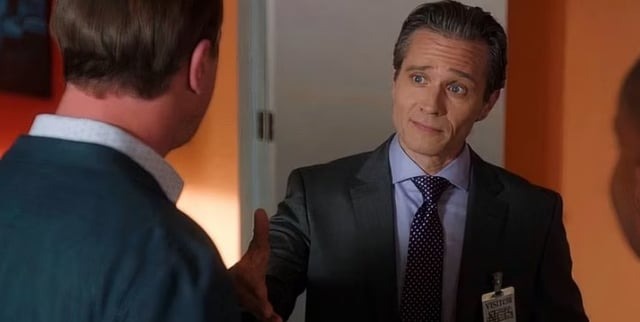
Introduction: Would Gibbs Be Proud?
Would Leroy Jethro Gibbs — the stoic, sharp-eyed leader of NCIS — nod in approval or furrow his brow in disappointment over Timothy McGee’s relentless pursuit of the truth about Jerome Laroche? It’s a question that gnaws at fans, especially those who’ve watched McGee evolve from timid probie to a capable, fearless senior agent.
McGee is no longer the kid who needed Gibbs’ constant guidance — he’s making bold moves now. But is he staying true to the principles his mentor taught him, or is he going rogue?
Let’s unravel this.
Gibbs and McGee: More Than Just Boss and Agent
Gibbs didn’t just lead McGee — he shaped him. From early on, McGee looked up to Gibbs with a mix of fear and admiration. Over time, their bond deepened into something that resembled a father-son dynamic.
But like any good parent, Gibbs didn’t handhold. He challenged McGee, pushing him to think for himself and make tough calls. In many ways, the man McGee is now is a direct reflection of that mentorship.
The Code Gibbs Lived By
Gibbs had his own unofficial “Bible” — a list of rules that guided every move he made. Rule #1: Never let suspects stay together. Rule #3: Don’t believe what you’re told. Double-check.
These weren’t just catchphrases — they were deeply ingrained in how he led his team. Gibbs valued loyalty, truth, and gut instincts. Above all, he admired agents who weren’t afraid to dig deeper, even if it meant getting their hands dirty.
Who Is Jerome Laroche on ‘NCIS’?
Jerome Laroche, a former Internal Affairs agent with a creepy calm demeanor, isn’t your average side character. He came with a mysterious past and questionable methods. From keeping a collection of suspect body parts (yes, seriously) to giving off a “too smooth to trust” vibe, Laroche always felt off.
McGee sensed it too — and couldn’t let it go.
The Suspicious Past That McGee Can’t Ignore
It wasn’t just a hunch. McGee started connecting dots that didn’t quite add up. Laroche had access to sensitive intel, operated with near immunity, and often bypassed standard protocol. McGee believed there was more — a skeleton in Laroche’s closet that could shake up NCIS’s foundations.
The question was: how far was he willing to go to find out?
McGee’s Shift From Rule-Follower to Rule-Breaker
Early seasons McGee wouldn’t dare defy orders. He played by the book, often to the point of being mocked. But now? He’s no longer afraid to challenge authority — especially when something smells off.
It’s a risky shift. But it’s also a sign that he’s grown. He’s channeling the very rule that Gibbs drilled into the team: Follow your gut.

How Gibbs Molded McGee’s Moral Compass
Gibbs didn’t believe in talking about feelings. He believed in action. And McGee, over the years, learned that doing what’s right sometimes means breaking the rules. That gray area — where justice lives — is where Gibbs spent most of his career. Now, McGee’s learning to live there too.
The Influence of Gibbs’ Rules on the Laroche Investigation
Let’s revisit Rule #36: If it feels like you’re being played, you probably are.
McGee’s gut told him something wasn’t right with Laroche. He applied Gibbs’ own rulebook — questioned motives, dug into backgrounds, and refused to accept surface-level answers. In many ways, this wasn’t rebellion. It was textbook Gibbs.
Truth Over Protocol: McGee’s Breaking Point
At some point, the chain of command stopped mattering. McGee’s need to uncover the truth about Laroche became personal. Was it pride? Maybe. But mostly, it was principle. When you’re taught by Gibbs, truth isn’t optional — it’s oxygen.
And when McGee hit dead ends, he didn’t back down. He found new leads, used back channels, and even risked career fallout. That level of tenacity? That’s pure Gibbs energy.
Why Gibbs Would Approve of Digging into Laroche
Despite his gruff demeanor, Gibbs had a soft spot for agents who thought independently and fought for justice — even when it came at a cost. If McGee’s intentions were pure (and they were), Gibbs would’ve understood. Maybe even smiled in that rare, crooked way.
After all, Gibbs didn’t want clones — he wanted thinkers.
Was McGee’s Obsession Personal or Professional?
There’s always the chance McGee took it too far. Obsession can cloud judgment. But there’s a fine line between obsession and passion. And McGee didn’t want vengeance — he wanted transparency.
When lives are on the line, “just following orders” doesn’t cut it. Gibbs would agree.
The Team Dynamic Without Gibbs
With Gibbs gone, a void was left. Torres is fiery, Knight is sharp, and Parker brings his own flavor of leadership. But it’s McGee who carries the torch of Gibbs’ legacy.
In investigating Laroche, he wasn’t just solving a mystery. He was stepping into a role he’s been preparing for since day one.
The Ethical Dilemma: Justice vs. Chain of Command
Do you go around the system to uphold it? That’s the paradox McGee faced. It’s the same moral puzzle Gibbs danced around his whole career. And it’s exactly why he would’ve respected McGee’s bold decision to go against the grain.
Fan Reactions: Do Viewers Think Gibbs Would Be Proud?
Fans have taken to forums, subreddits, and social media to debate this question. The consensus? Overwhelmingly, yes. Many see McGee’s actions as the natural evolution of Gibbs’ influence. Not rebellion — but reflection.
And let’s be honest, it felt good watching McGee go full Gibbs-mode.
The Legacy of Gibbs Through McGee’s Actions
When people think of Gibbs, they remember his rules, his stare, and his silence. But his legacy lives on through McGee — the agent who once needed constant direction, now leading with conviction.
McGee isn’t trying to be Gibbs. He’s proving that Gibbs didn’t train soldiers — he inspired leaders.
Conclusion: Would Gibbs Smile at McGee’s Growth?
Absolutely. Gibbs might not say it out loud. But he’d watch McGee from afar, nod slightly, and walk away — proud but silent.
McGee’s pursuit of the truth about Laroche wasn’t just another investigation. It was a defining moment. It proved that the student had become the master. And if Gibbs taught us anything, it’s that doing the right thing — especially when it’s hard — is always worth it.
FAQs
1. Was Jerome Laroche ever proven guilty on NCIS?
No definitive proof was ever revealed on the show, but McGee’s suspicions highlighted serious red flags in Laroche’s behavior.
2. Did McGee break any official NCIS rules during his investigation?
While he bent some protocols, his actions aligned with the core mission of NCIS — uncovering the truth and protecting the innocent.
3. Is Gibbs ever returning to NCIS to react to McGee’s transformation?
There’s no official word, but many fans hope for a surprise appearance or cameo to affirm Gibbs’ silent approval.
4. How has McGee’s leadership evolved since Gibbs left?
McGee has grown more confident, assertive, and instinct-driven — all traits nurtured under Gibbs’ mentorship.
5. What lesson does McGee’s Laroche pursuit teach newer NCIS viewers?
It underscores the importance of trusting your gut, challenging authority when necessary, and always choosing truth over comfort.
If you’re a fan of NCIS and ever wondered whether Gibbs’ legacy still lives on, look no further than McGee — a quiet warrior who learned from the best, and isn’t afraid to chase justice, no matter the cost.